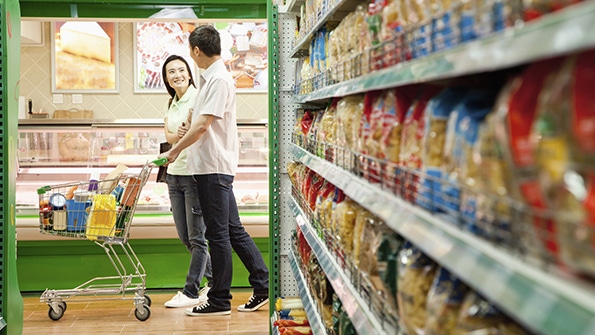Ag departments look to creatively offer solutions to help farmers and address food insecurity.
May 1, 2020

As the COVID-19 pandemic continues to trudge on, the consequences of these massive food supply changes are being felt across the country. America’s food supply chain is being put to the test, and National Association of State Departments of Agriculture (NASDA) members are rising to the challenge.
The closure of restaurants, hotels and schools has caused a precipitous drop in food and beverage demand. Meanwhile, a surge in grocery store purchases has left many consumers facing empty shelves when they visit the store. A recent figure from the American Farm Bureau Federation illustrates that while expenditures at grocery stores have risen 27% to $73 billion, foodservice establishments are experiencing a 25% decline – the largest year-over-year decline in industry history.
Many dairy farmers have been forced to dump milk after watching their typical foodservice marketing channels dry up, produce has been left unharvested in southern states due to reduced institutional demand and meat processing facilities are closing in some states to protect employee health. At the same time, many food distribution centers across the U.S. are being affected as they compete with grocery retail chains to procure food to distribute to those in need.
In the face of these challenges, state departments of agriculture are directly answering American’s needs by developing creative solutions to market and distribute food through safe, efficient and innovative approaches.
Iowa Gov. Kim Reynolds, Lt. Gov. Adam Gregg and secretary of agriculture Mike Naig launched a new “Pass the Pork” program to connect Iowa pig farmers with food-insecure residents. Through Pass the Pork, the Iowa Pork Producers Assn. (IPPA) and the Iowa Department of Agriculture & Land Stewardship are helping the state's pig farmers donate pigs to Iowa food bank feeding programs. Local meat processors are extending their hours of operation to process and package the pork donations to help meet the growing demand for food bank and food pantry resources. Iowa food banks are getting the pork into the hands of those in need.
Pass the Pork will officially begin when the first donated pigs are delivered on May 1. Processing will continue in May and for as long as processing capacity and funds remain. To donate funds to help support this program, visit the Iowa Food Bank Assn. website at donorbox.org/passthepork.
The Wisconsin Department of Agriculture, Trade & Consumer Protection joined forces with Dairy Farmers of Wisconsin and the Wisconsin Hunger Task Force to launch the “Million Dollar Wisconsin Dairy Recovery Partnership.” Through the program, dairy farmers will be paid for supplying milk to a dairy co-op that is supplying milk for free to local food banks and pantries.
Florida Department of Agriculture & Consumer Services commissioner Nikki Fried constructed the "Florida Farm to You" list of commodities as part of a larger initiative through the department’s COVID-19 resource webpage -- a move that aims to connect Florida producers with consumers and businesses to purchase Florida-raised products.
The New Mexico Department of Agriculture (NMDA) announced that the New Mexico State University Cooperative Extension Service recently unveiled a “Seed to Supper” program for residents who are interested in beginning to garden at home. The program provides free seeds and gardening guidance both online and through a paper booklet with the purpose of supplying New Mexico families with access to healthy foods as well as providing an educational opportunity for families across the state.
Mississippi Department of Agriculture & Commerce commissioner Andy Gipson is encouraging Mississippi’s consumers to prioritize local farmers markets in their grocery runs. The department compiled a list of farmers markets, hours of operation and unique methods for making purchases in the wake of the current pandemic, including online pre-ordering and curbside pickup. Additionally, through the existing Genuine MS food marketing program, several farms are offering direct-to-consumer food boxes for pickup through the online portal.
The Maryland Department of Agriculture (MDA) has provided continuous updates to the state’s agriculture sector on relief programs and resources during the pandemic, with the governor recognizing agriculture as the state's top industry. In addition, MDA is working to connect consumers with farmers and seafood producers in the state and encouraging the purchase of local products. Since some restaurants in the state continue to purchase food and grant carryout orders, MDA, in partnership with other state agencies, announced the “Keep Calm & Carry Out” social media campaign -- a simple slogan to support the vitality of restaurants and the producers who supply them.
Kentucky Department of Agriculture commissioner Ryan Quarles has encouraged consumers to utilize its Kentucky Proud webpage to locate farmers markets offering locally grown fruit and meat products. The department also relaxed income guidelines for residents hoping to receive food through the emergency food assistance program. The request for increased income guidelines through TEFAP was quickly approved by the U.S. Department of Agriculture and will allow those with dramatically reduced income to receive benefits through local food banks. Kroger, the nation’s largest food retail chain, has worked with the Kentucky Department of Agriculture to increase sales of locally grown Kentucky meat products -- a move that provides some relief for the state’s livestock producers.
In addition, several more state departments of agriculture have quickly created interactive maps and directories to locate local farms and other sources of fresh food:
You May Also Like

.png?width=300&auto=webp&quality=80&disable=upscale)

